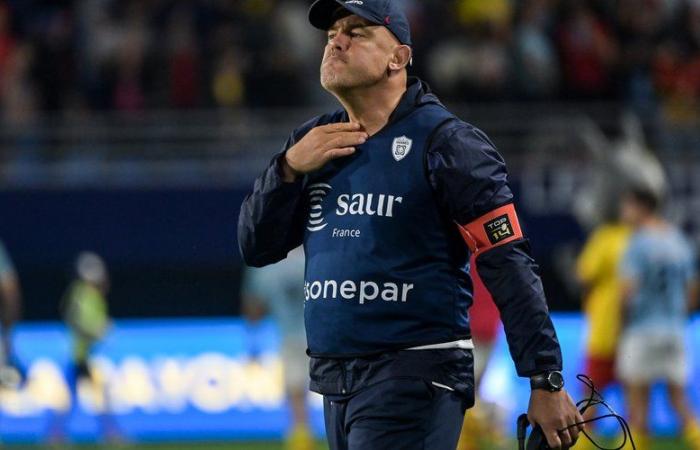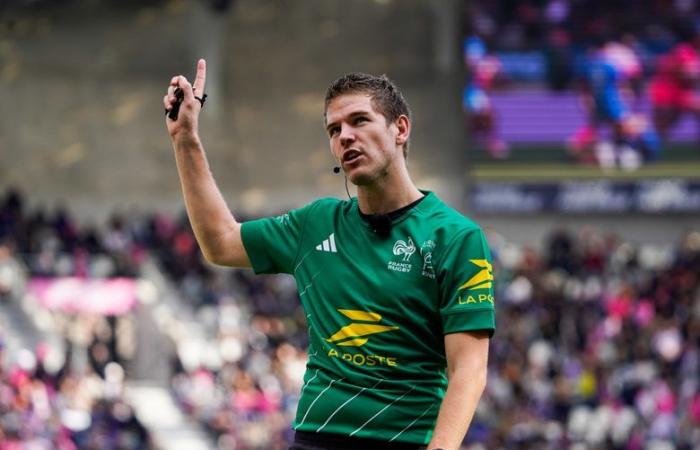Beaten by UBB (37-29) after having led up to 29-0, RC Vannes remains last in the Top 14. Is the promoted victim of unfavorable arbitration, because of its status? This is what his manager Jean-Noël Spitzer suggested after the meeting. Which is difficult to validate by the facts…
The meeting between Vannes and UBB, by its story, was therefore superb and Bordeaux, led up to 29-0 in this crazy game, finally reversed the course of this story to win on the RCV field on Saturday evening (29-37). Sensational by the scenario, obviously cruel for the Bretons who, after having held a resounding feat in their hands, collapsed to finally conclude without the slightest point in the ranking. And this question which animated the post-match: did Vannes also suffer from unfavorable refereeing and, further, is the RCV refereed like a child?
The question did not come to us alone. It was blown away by the Vannes manager, Jean-Noël Spitzer, who was reminded at a press conference at the end of the meeting. “We arbitrate the status of the clubs. C’is frustrating, all your work for the week can be thrown to the ground by this, swept away. We have this feeling, a feeling ofiniquity. It’s easy to put our heads under water, there is this impression that thisThis will have no consequences.”
Icon Sport – Eddy Lemaistre
In the viewfinder, the second period obviously, which saw his men concede a severe 30-0. What Spitzer denounces the influence of thearbitrage a you context, that of a match between two teams with opposing pretensions and which takes place under the television spotlight of Canal + “premium”. Afterwards ? He remains quite vague on what he actually criticizes Mr. Rousselet for. “Ce are televised matches, in the evening, the referee sees the score which is increasing for a team which must play for the title… He will rebalance, obviously.“
The shadow of the conspiracy theory
The Calimero’s lament, do we agree? Not really, to be honest. At this point, Jean-Noel Spitzer casts the opprobrium and guilt for the defeat of his people on a single man, obviously outside his field of responsibility, without supporting it with solid arguments other than suspicion. Which is already average, to say the least.
The idea of context East also intriguing: following the RCV manager on this ground means accepting the idea that a arbitrator no longer just directs a match, no longer judges no longer only the faults committed and therefore the actions, but passes all this through the filter ofand the environment. Do we referee differently, depending on whether a match is broadcast on Canal + or Rugby +? Do we whistle fouls more or less, depending on whether the match pits two teams of balanced rank against each other or whether it pits two clubs from different spheres against each other? distantare? Understand that with all these allusions, it is difficult to bring approbation. Besides, we are no longer even very far from conspiracy theory…
Icon Sport
There remains then the fact of this match, and this rather improbable scenario which gives rise to legitimate frustrations. On both sides, moreover, we imagine that Yannick Bru will have kept in his throat the first period quite unworthy of his players, absent in the aggressiveness and the fundamentals of this game.
Two yellow cards yet “happy” for Vannes
As for the refereeing, and more particularly this second period which has been singled out, we will have noted some questionable sequences, as in every rugby match, since interpretation is also a component of this game. But nothing blatant and who deserves to cry foul. This goes both ways, by the way.
As for the “changeover times”, those where the whistles really influence the epilogue of the match, we are left with these two images: in the same action (56th), the Vannes players received two yellow cards and a penalty try. What exactly happened? On a strong Gironde beat, Breton fullback Paul Surano first stopped Paul Uberti with a high tackle, at the end of the line on the left. The match referee, Benoît Rousselet, called the video assistance for the first time before delivering his conclusion: “It’s foul play. The tackler is high, we have a conadirect to the head so the degree of danger is high.” Red card? Not yet, since he would find an extenuating circumstance: “The white player comes back inside, which brings me down to a yellow card against the Vannes 15.” A yellow card “only”, which then seemed very fortunate for the Bretons.
Following, on the same action and on the other side of the field, the UBB pushed again and Temo Matiu, at the end of the line, was in turn stopped illegally by Francis Saili (high tackle, head to head). Mr. Rousselet still relied on the video: “We have foul play because the blue 12 is high. The degree of danger is high because for me, there is speed and strength.” Once again, however, the referee found an attenuating circumstance. “The white player comes back inside, that’s why there is contact. So there will be a yellow card.” In the game of “mitigating circumstances”, the RCV therefore avoided two red cards (even if it was still sanctioned with a penalty try for this action). Enough to weigh up the idea that Vannes, Saturday evening, owes its incredible defeat only to the referee.







